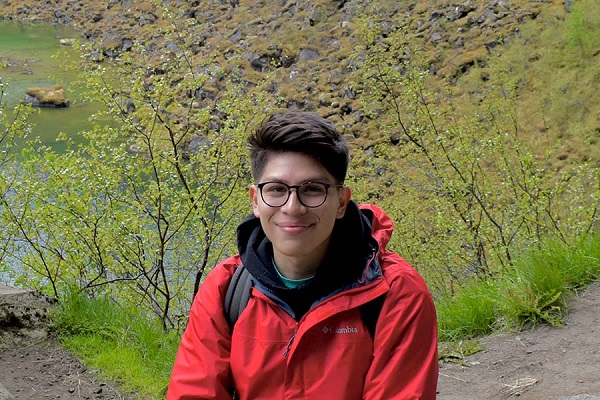Environmental science from the ranch to ASU West
Guillermo Ortiz has always been fascinated with the natural world. It started during his childhood while he tended to livestock and plants on his family’s ranch, but his interest didn’t reach to academia until high school.
“It wasn’t until I got into an environmental science course in high school that I found out there’s a way to explore my interest in biology with an environmental emphasis,” said Ortiz, who graduated with a degree in environmental science from ASU in May.
Ortiz’s interests lie particularly in soil science, where he studied under the mentorship of Arizona State University New College Professor Becky Ball. During the summer of his sophomore year, he studied abroad on a trip led by Ball to northern Finland, where he and an art student designed their own research project and learned about the crossroads between art and science.
“I learned communication is key,” Ortiz said. “If you conduct groundbreaking research and can’t communicate it and make people believe it’s important, then it’s almost as if it’s useless because you can’t get people excited about it.”
Ortiz told us more about his experience at ASU and potential plans for the future.

ASU grad Guillermo Ortiz
Question: What’s something you learned while at ASU — in the classroom or otherwise — that surprised you or changed your perspective?
Answer: A lot of the questions that I couldn’t find sufficient answers for when I was little and working on the ranch, I can go back now and remember back to those times when I had those questions and now be able to answer them. Whenever anyone from my ranch has a question about why a certain plant might not be doing well, I can use my experience in soil science to point them in the right direction.
I also took a course my junior year called environmental chemistry. We discussed toxins we’re exposed to day to day, even in our own home, and what it means for humans and our environment.
Q: Why did you choose ASU?
A: At first, I wasn’t too ecstatic about it — I viewed it as a really big university and thought I’d be left behind in some of my classes. But after learning about the West campus, I learned that I could have the benefit of being at a big research university along with the close-knit community at the West campus. That was a big incentive for me.
Q: Which professor taught you the most important lesson while at ASU?
A: The first person I think of is Becky Ball. She was the first professor who allowed me in a lab space and has helped me throughout my entire undergraduate career to conduct research and get more involved in academia. She’s exposed me to a lot of opportunities, and I don’t know if I would be in the same place I am right now if it wasn’t for her.
Q: What’s the best piece of advice you’d give to those still in school?
A: Even though you may fail greatly in some areas, that doesn’t mean you should stop pursuing your dreams or degree. I know that I’ve experienced some big tumbles academically, especially toward the beginning of my degree, and I know it can feel discouraging, but I want people to keep going and learn from their mistakes rather than letting it be something that bogs you down.
Try to be resilient and use failure in a positive way. Really take the time to look for opportunities, whether it’s employment or research experience. See what professors have to offer. By getting into contact with them, you really increase your chances of finding something that suits you. Also, however far you get in your career, it’s always important to give back to people who were once in your position with no experience and eager to find any opportunity — if you can provide it, definitely do it.
Q: What was your favorite spot on campus, whether for studying, meeting friends or just thinking about life?
A: Definitely the top floor in Fletcher Library. The TRIO rooms that they have for members were also a go-to spot.
Q: What are your plans after graduation?
A: After graduation, I’m going to be starting my environmental science PhD on the Tempe campus.
Q: If someone gave you $40 million to solve one problem on our planet, what would you tackle?
A: A lot of that money should be put toward investing in companies that are really interested in creating a product that doesn’t create waste — addressing plastic pollution and investing in products that last longer. I’d also suggest making an agency that could fund more scientific projects.